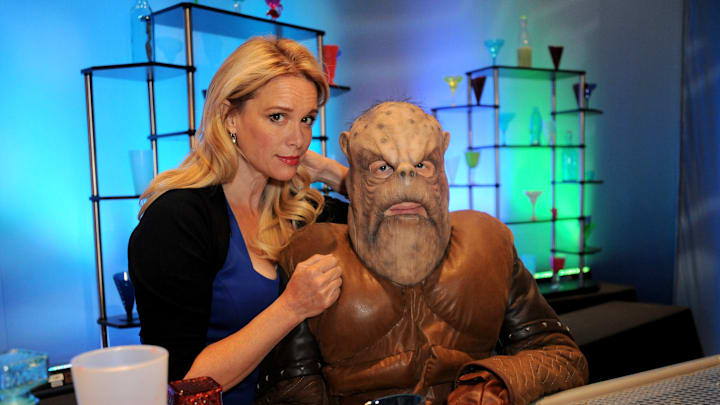Star Trek: Deep Space Nine upped the ante for not only Star Trek shows but for all syndicated programming in the area. With no universally set date and time a show would air, different cities would air syndicated platforms at a variety of times, and across a variety of networks. One city could have Deep Space Nine on at 8:00 PM on a Friday, while another city could have them on an unaffiliated channel at 2:00 on a Sunday.
Due to this, most shows didn't want to do an overarching narrative across the series. It was too hard to make sure fans saw every episode, in the order they saw it. That's a big reason why series like Star Trek, Hercules, and other syndicated shows of an era didn't do too many branching storylines that took you from week to week.
You'd have your occasional two-parter but that was usually it. Yet, Deep Space Nine bucked the trend and started doing episodes that led into one another, with a plotline that wove in and out of episodes. This started really around season five in earnest, but elements of it were there far earlier. The Dominion War is often the vocal point of the conversation of Deep Space Nine's shift from episodic to serial. No longer doing self-contained episodes, but further exploring plot points over the course of multiple episodes and even seasons.
It was a new take on Star Trek, one that Enterprise would start to incorporate more of in season three. They, however, aired on a nationally recognized channel, UPN, making it easier to follow shows week in and week out, without the concern of a network moving a beloved show for a random reason. A common occurrence back then.
The move made sense, too. At the time, it was a novel idea. Most shows, from sitcoms to procedurals and everything in between, were episodic. Even as cable and satellite television became more popular, it would be rare to see episodes of popular series truly divulge into serial broadcasts. With most shows opting to instead wrap up the plotline by the credits of that week's given episode.
Thus making Deep Space Nine and to a lesser degree Enterprise, icons to a degree for bucking the trend. Yet, as we've fully saturated ourselves in the Streaming Wars, shows like them are no longer the exception. They are now the rule. Just about every show, save for some major hits like the kid's show Bluey, has long, drawn-out narratives, that branch not just into episodes, but into the entire series.
The idea is to make how into a multi-part movie. With each part leading into another. It's become so common that people are now turning away from such programs. With so much content to watch, from YouTube to Netflix, to cable and sports, not to mention music and podcasts and lord knows what else, we just don't have the same time anymore to invest in one show putting out a 20-part movie.
The Arrowverse on the CW was the group that made this abundantly clear. They had numerous shows, with each episode running into another. Often crossing over with one another, forcing you to watch shows you had no interest in just to better understand the plot line. It worked for a time until it didn't.
That may have been the beginning of the end for people wanting for long-form, serialized content. Long, branching narratives are no longer something people want to consume. They need to be able to dip in and out as they see fit, without having to watch every episode.
It's why so many fans want and need Star Trek to stop serializing their shows. Just looking at Discovery, it's not going to be a show where you can go back and watch just one episode. It's so interconnected that if you're new to the franchise, you're going to need to watch every episode up until a certain point, just to know what's going on.
That's not an issue with The Next Generation or Voyager. They keep their shows tight to 42 minutes, show you everything you need to know before the opening credits, and have you feeling fulfilled by the start of the credits. You don't need to watch every episode of The Next Generation just to know what's going on in The Best of Both Worlds Part 1. Nor do you need to understand the first four seasons before getting to Voyager's Timeless episode.
That's not the case in Discovery. It's why so many of us are so into Strange New Worlds. They keep their episodes nice and tight to 42 minutes, with a better-than-average ability to jump into an episode blind and be able to understand what's going on.
That's why Star Trek needs to revert all of its shows to episodic going forward. We no longer have the time or desire to sit through boring episode after boring episode just to see what the hype is about. Deep Space Nine did a bold new thing, but continuing its trend isn't going to help the franchise. It's going to hinder it. As we have less and less free time, we don't need to be investing it into every episode of a franchise that rarely ever hits the mark.
